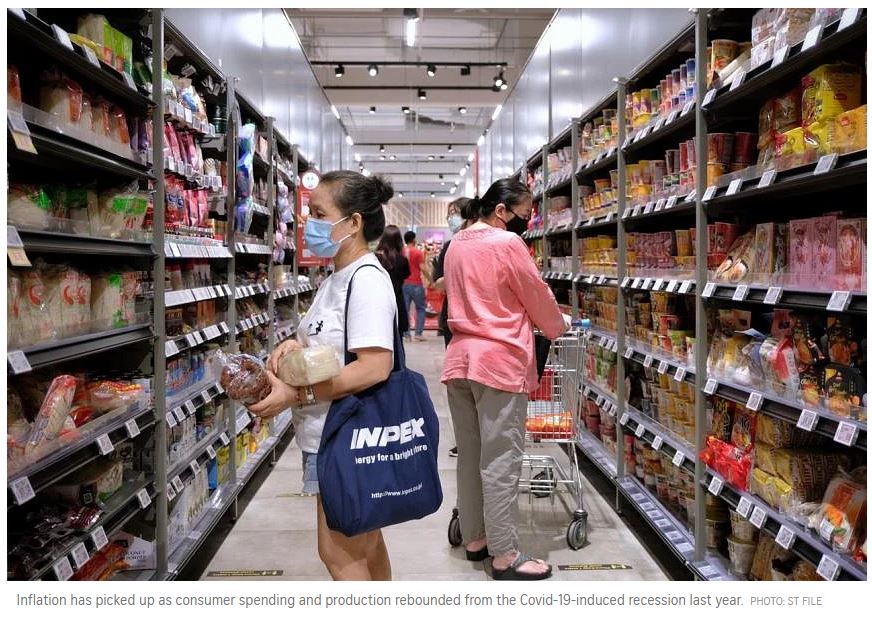Singapore: Inflation may ease next year, but that outlook is still uncertain, MAS says in annual report
SINGAPORE – Singapore’s central bank believes inflation may abate next year, but warned that if prices and wages continue to remain elevated a deeper cut in economic growth could be needed to achieve stability.
“Inflation is expected to ease in 2023 as major central banks withdraw policy accommodation and supply challenges are addressed. However, the outlook is subject to considerable uncertainty,” said the Monetary Authority of Singapore (MAS) in its 2021-2022 annual report.
“A key risk is that the current upsurge in inflation could become embedded in price and wage settings, worsening the output sacrifice required to restore price stability,” MAS said in the report issued on Tuesday (July 19).
It flagged the risk of additional strains on supply chains, causing more price shocks and increasing the risk of a de-anchoring of inflation expectations – a situation where households and businesses expect prices to remain higher than their historical averages.
MAS managing director Ravi Menon warned of a recession in some major economies and stagflation, where growth stagnates while inflation continues to rise.
The central bank explained that inflation has picked up as consumer spending and production rebounded from the Covid-19-induced recession last year, while supply constraints remained unresolved.
Tightening labour markets and rising core inflation in some economies suggested that a broader inflationary process has taken hold.
Then the war between Russia and Ukraine – two major commodity producers – that started in February this year added an even more powerful impulse to inflation through steep increases in the prices of commodities.
While the price shock will squeeze real incomes, elevated savings will provide some buffer to demand and help the global recovery to continue at a more moderate pace, said MAS.
To help slow the inflation momentum from imported and domestic cost pressures and ensure medium-term price stability, MAS pre-emptively shifted to a positive rate of appreciation and has tightened monetary policy four times since October last year.
Singapore’s economic growth since last year was underpinned by strong outturns in the trade-related and modern services sectors.
However, MAS noted that in the second half of this year, slowing growth in the global economy will weigh on Singapore’s trade-related sectors, even as the domestic-oriented and travel-related sectors continue to recover.
MAS said Singapore’s gross domestic product growth is likely to come in within the lower half of the 3 per cent to 5 per cent forecast range.
However, it added that overall inflationary pressures will remain elevated in the months ahead.
Although global supply chain frictions are easing, external inflationary impulses have become more broad-based, reflecting underlying constraints in international commodity and labour markets.
On the domestic front, wage pressures are likely to stay strong amid the tight labour market, the central bank said.
Mr Menon said: “Inflation is expected to get worse before it gets better.”
For this year as a whole, MAS core inflation is projected to average 3 per cent to 4 per cent, while headline inflation is forecast to come in within 5 per cent to 6 per cent.
The MAS chief said that while inflation is expected to ease further next year, it will remain well above the 1.5 per cent rate average since 2000.
He added that the projected profile of inflation will depend on some stabilisation of global commodity prices and the unwinding of global supply chain constraints, as well as a strong pick-up in inflows of non-resident workers that will help to alleviate domestic labour shortages.
“If there are fresh shocks to global energy and food supplies arising from the ongoing conflict in Ukraine or a significant overheating of the domestic labour market, inflation may end up being higher and more persistent,” he warned.
Source: https://www.straitstimes.com/business/economy/inflation-may-ease-next-year-but-that-outlook-is-still-uncertain-mas-says-in-annual-report


 English
English




